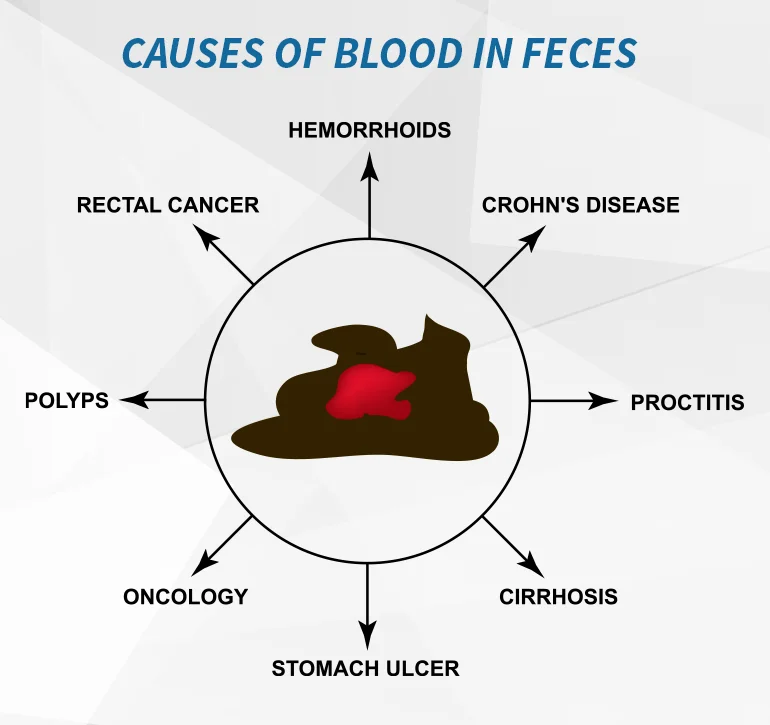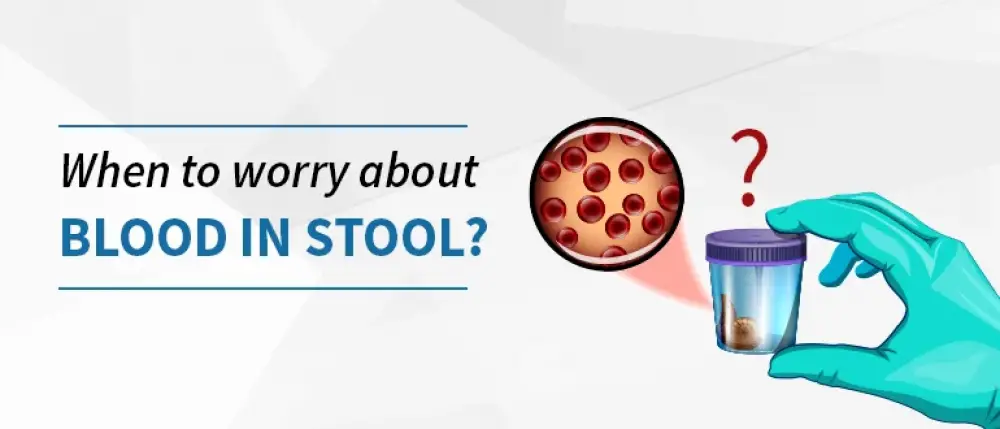Despite ample awareness, people often tend to shy away from discussing several health conditions openly. And by the time someone realises its severity, it is too late. Blood in stool is one such condition which we shouldn’t ignore.
A number of factors can cause blood in the stool and if left untreated for long, it can be a reason for developing the risk of critical illnesses including cancer.
However, it may also be a symptom of a mild condition such as haemorrhoids (piles) less serious than other diseases. Simply put, blood in stool should be treated immediately. In this article we’ll discuss the causes, symptoms and how to prevent blood in stool.
When to Worry about Blood in Stool?
Well, most of the people get apprehensive after seeing blood in stools, and they relate it to a possible infection. However, under normal circumstances a minimal loss of blood while defecating is harmless. Sometimes, an excessive or harsh use of toilet paper can result in bleeding. Even an unhealthy food habit or excessive drinking may cause this problem, which can be cured by altering dietary habits or change in lifestyle.

On the flip side, if you are facing excessive bleeding while defecating, you should consult your physician right away.
What are the Causes of Blood in Stool without Pain?
The very first thought that comes to your mind after seeing blood in stool being why am i pooping blood with no pain?
Well, it can be quite nervy to notice blood in the faeces. Usually, one may experience intense pain or burning sensation while bleeding. However, if your anus is bleeding and you are not feeling any pain, believe us; it’s a serious health issue!
Hence, knowing the cause of rectal bleeding is imperative to take proper precaution.
Here are the common causes of blood in stools:
- Excessive consumption of spicy food containing red chilli, pepper and other condiments.
- Injury in the lining tissue of of the colorectal system called mucosa
- Anal fissures
- Certain Inflammatory bowel syndromes such as the ulcerative colitis or the Crohn’s disease
- Rectal bleeding may also be a symptom of a severe disease called Colorectal cancer.
Blood in Stool: Possible Health Complications
Sometimes, the lower rectum in our anus begins to bear Haemorrhoids or swollen veins. These are also called varicose veins of the anus, and are a common cause of blood in stools. In common parlance, these are called internal piles. But, if these veins begin to grow in your lower rectum, it might hint developing the risk of following health complications:
Rectal Polyps: These refer to the overgrowths of tissue of the colon area, appearing like a mushroom. Generally, the Polyps don’t cause pain. They simply discharge the blood into the lower intestines and this causes bleeding in your stool. Usually, the polyps are not a cause of worry. They can be treated with colonoscopy surgical treatment. However, in some extreme cases, polyps may become cancerous if not treated timely.
Rectal Prolapse: When the rectum comes out of the anus, it is known as rectal prolapse. More severely, the complete rectal wall may drop down through the anus. Since this is a sensitive internal part of the body, it may bleed while defecating.
Rectal Ulceration: Rectal Ulcer refers to the ulceration in the rectum. This may be caused due to several conditions such as chronic constipation, inflammation due to IBD, or due to anal sex or insertion of foreign objects into anus.
Diverticular Bleeding: This happens if a small pouch called diverticulum forms in the lining of the lower part of the large intestine. Sometimes, a diverticular blood vessel ruptures leading to bleeding.
Anal Fistula: This is an abnormal development of a passage from the inner part of your anus to the outer skin of the buttocks. This causes uncontrolled discharge of faecal waste along with blood and pus.
Do Foods Cause Blood in Stool?
The types of food you consume have a direct impact on your bowel movement. It can be a cause for blood in stool as well. However, fibrous food such as beet, tomatoes or other vegetables have the ability to turn stool red. These include:
- Spicy food containing high quantities of red chilli, tabasco pepper or other flavouring ingredients contain high amounts of Capsaicin, which is known for causing diarrhoea if consumed in excessive amounts. Capsaicin reacts with pain receptors in the body, which causes burning sensation from top to bottom.
- Chewing of pan-masala, zarda and khaini can also cause bloody stools, due to the presence of slaked lime in these products.
- Excessive drinking causes digestive disorders, especially intestinal abnormalities, including constipation and bloody stools. Ethanol present in alcohol, turns into acetaldehyde (C2H4O) after digestion. Acetaldehyde is a compound that causes severe irritation in the outer lining of the digestive organs, particularly the rectum. This causes Haemorrhoids and anal fissures.
- Hence, it is always advised to be mindful of whatever you are eating to avoid any adversity. Ideally, you should limit the consumption of red peppers and alcohol for healthy living.
What does Blood in Stool mean for a Woman?
Bleeding among women is natural in case of menstruation or menopause. However, people tend to relate these two processes with blood in stool, which is a myth. Rectal bleeding among women can be linked to symptoms of other health conditions including:
- Vomiting or nausea
- Unexpected weight loss
- Rectal Pain
- Painful Bowel movement
- Abdominal pain
- Diarrhoea
- Fatigue
An excessive bleeding while defecation has the same health implications for both men and women. This should be treated immediately.
>> Also Read: Bowel Cancer Signs: Symptoms That Indicate Growth of Malignant Tumour
How to Treat Blood in Stool?
The moment you see blood in your stool, consult a doctor without any delay. Hiding will not help anymore. While getting treatment is recommended, here are some tips to manage this condition to an extent:
- Never exert too much while defecating. This can cause rupturing of haemorrhoids or anal fissures.
- Apply only prescribed ointments/creams for treating the haemorrhoids.
- Drink plenty of water to improve digestion and excretion.
- Consume more fibre to improve your digestion and excretion.
- Avoid a sedentary lifestyle, and if possible move your body in frequent intervals to ease the pressure in your lower torso while sitting.
- Get relevant consultation from your physician regarding surgery for haemorrhoids, or colorectal cancer, or Inflammatory Bowel Disease (IBD).
Blood in Stool and Colorectal Cancer?
As mentioned above, blood in stool can spur the risk of developing colorectal cancer, it is important to get the diagnosis done. The entire process of diagnosis is done with an advanced medical technique called colonoscopy.
- In this technique, the biopsy is done by removing a small part of the colon tissue with a specialised instrument passed through the scope. Sometimes, the surgeon may take out the larger part of the colon for diagnosis.
- In the next stage, biopsy samples are taken to the pathlab for further observation.
- In case of detection of cancer, further pathological tests, such as the molecular test, are done to assess the stage of the cancer.
Battle Colorectal Cancer with Care Health Insurance
Without giving a second thought, get your treatment done immediately after diagnosis of cancer. The sooner it is treated, the better it is.
Now, the most prevalent concern is the exorbitant expenses involved in the treatment of cancer. Here comes the importance of health insurance covering cancer to play. Based on the fixed-benefit principle, cancer health insurance pays out a lump sum amount on diagnosis of cancer. The compensation can be used for paying off the treatment expenses or other liabilities such as EMIs, educational fees, debt, mortgages etc. Our critical insurance plan, which covers cancer along with other 32 listed illnesses, can be a good option to consider. Starting from covering the insured for in-patient expenses to comprehensive protection at all stages, the policy can be a boon to all cancer battlers seeking smooth recovery.
For more information you can allow us to guide you. Don’t forget to share your thoughts about this article.
Also Know : Health Insurance Policy Details
Disclaimer: Plan features, benefits, coverage, and claims underwriting are subject to policy terms and conditions. Kindly refer to the brochure, sales prospectus, and policy documents carefully.
*The Insured Person would receive a flat 100% of the base Sum Insured on a cumulative basis irrespective of claim for unlimited period . At the time of Policy renewal if the Policyholder chooses not to renew this Optional Benefit, then the Infinity Bonus under the expiring Policy shall be forfeited.



